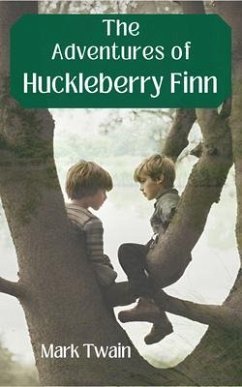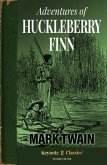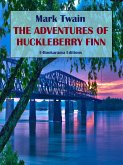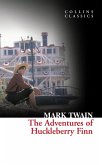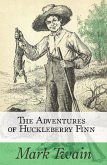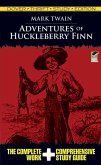Mark Twain's "Adventures of Huckleberry Finn" is a literary masterpiece that unfolds against the backdrop of the antebellum South, painting a vivid portrait of a society torn by racial tensions and moral dilemmas. At its heart is Huck Finn, a spirited and resourceful young boy, whose compelling narrative voice invites readers on a captivating journey down the mighty Mississippi River.
The story commences with Huck's escape from the clutches of his alcoholic father, a move that propels him into a world of freedom and self-discovery. Soon, he finds an unlikely companion in Jim, a runaway slave seeking liberty. The dynamic between Huck, with his irreverent charm, and Jim, embodying quiet strength, becomes the beating heart of the narrative.
As the duo meanders down the river on a makeshift raft, they encounter a mosaic of characters and scenarios, each a microcosm of the societal complexities that Twain masterfully unravels. The novel's humor is both light-hearted and satirical, offering a sharp critique of the prevailing social norms of the time. Twain's wit infuses the narrative with a timeless quality, making it as relevant today as it was in the 19th century.
One of the most poignant elements of the tale is Huck's internal struggle with the moral implications of helping Jim attain freedom. Twain deftly explores the conflict between societal expectations and personal conscience, forcing Huck to grapple with questions of justice, humanity, and individual agency. This internal journey transforms Huck from a naive boy into a symbol of defiance against the prevailing norms of a society steeped in racism.
The novel is a profound exploration of the theme of freedom, both physical and moral. As the characters navigate the unpredictable currents of the Mississippi, they confront not only the physical challenges of the journey but also the societal currents that threaten to engulf them. Jim's quest for freedom becomes a metaphor for the broader struggle against oppression and the innate human desire for autonomy.
Twain's narrative style is a masterclass in colloquialism, immersing readers in the authentic voices of the characters. The Southern vernacular adds depth and richness to the storytelling, creating a narrative texture that is both immersive and evocative. Through Huck's eyes, readers gain insights into the contradictions of the Southern society, from the humorous idiosyncrasies of its people to the darker undercurrents of racism and prejudice.
"Adventures of Huckleberry Finn" is a novel that defies easy categorization. It is a coming-of-age story, an adventure tale, and a social commentary all rolled into one. Twain's narrative brilliance lies in his ability to seamlessly weave these elements into a cohesive and emotionally resonant tapestry. The novel is a celebration of the human spirit's indomitable will to break free from societal constraints and seek a higher moral ground.
The story commences with Huck's escape from the clutches of his alcoholic father, a move that propels him into a world of freedom and self-discovery. Soon, he finds an unlikely companion in Jim, a runaway slave seeking liberty. The dynamic between Huck, with his irreverent charm, and Jim, embodying quiet strength, becomes the beating heart of the narrative.
As the duo meanders down the river on a makeshift raft, they encounter a mosaic of characters and scenarios, each a microcosm of the societal complexities that Twain masterfully unravels. The novel's humor is both light-hearted and satirical, offering a sharp critique of the prevailing social norms of the time. Twain's wit infuses the narrative with a timeless quality, making it as relevant today as it was in the 19th century.
One of the most poignant elements of the tale is Huck's internal struggle with the moral implications of helping Jim attain freedom. Twain deftly explores the conflict between societal expectations and personal conscience, forcing Huck to grapple with questions of justice, humanity, and individual agency. This internal journey transforms Huck from a naive boy into a symbol of defiance against the prevailing norms of a society steeped in racism.
The novel is a profound exploration of the theme of freedom, both physical and moral. As the characters navigate the unpredictable currents of the Mississippi, they confront not only the physical challenges of the journey but also the societal currents that threaten to engulf them. Jim's quest for freedom becomes a metaphor for the broader struggle against oppression and the innate human desire for autonomy.
Twain's narrative style is a masterclass in colloquialism, immersing readers in the authentic voices of the characters. The Southern vernacular adds depth and richness to the storytelling, creating a narrative texture that is both immersive and evocative. Through Huck's eyes, readers gain insights into the contradictions of the Southern society, from the humorous idiosyncrasies of its people to the darker undercurrents of racism and prejudice.
"Adventures of Huckleberry Finn" is a novel that defies easy categorization. It is a coming-of-age story, an adventure tale, and a social commentary all rolled into one. Twain's narrative brilliance lies in his ability to seamlessly weave these elements into a cohesive and emotionally resonant tapestry. The novel is a celebration of the human spirit's indomitable will to break free from societal constraints and seek a higher moral ground.
Dieser Download kann aus rechtlichen Gründen nur mit Rechnungsadresse in A, D ausgeliefert werden.

